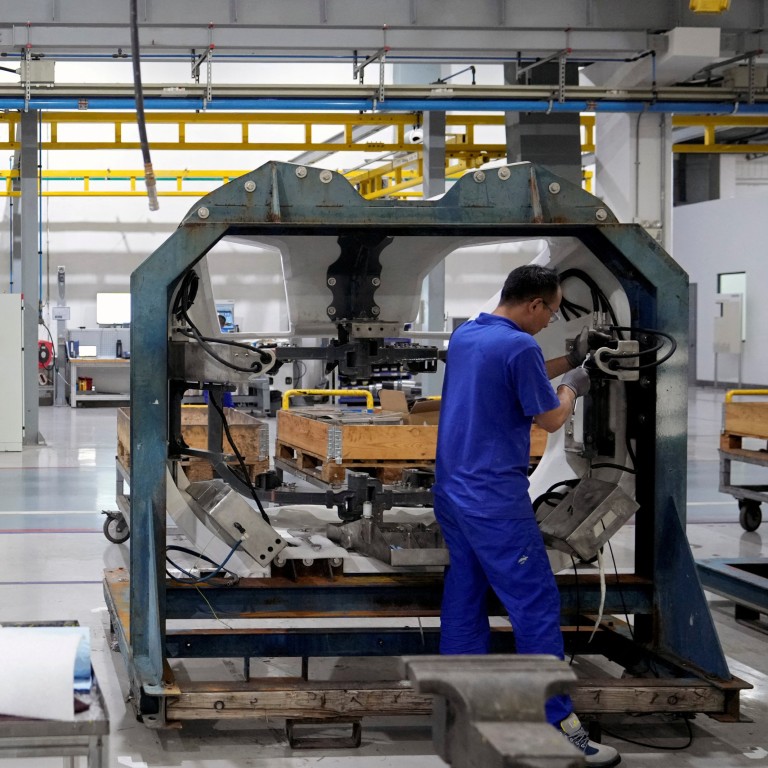
Covid-19 outbreaks put China’s supply chain in the spotlight again, as foreign firms demand ‘solutions’
- Covid disruptions could fray the nerves of foreign investors, while accelerating diversification plans among multinationals
- Some coastal authorities in provinces like Guangdong are scrambling to keep as many workers as possible to fulfil overseas orders
China is racing against time to stabilise its workforce and domestic production, as widespread Covid-19 infections test the country’s capability to fulfil overseas orders and threaten its status as the world’s pre-eminent manufacturing hub.
Fresh virus outbreaks have put China’s supply chain in the spotlight once again, sparking concern that disruptions could fray the nerves of foreign investors further, while weakening the country’s competitiveness and accelerating diversification plans among multinationals.
“Since the 2022 lockdowns of zero-tolerance, China has basically opened the door in other countries for foreign investment,” Joerg Wuttke, president of the European Chamber of Commerce in China, said in an interview.
“We actually don’t wait for China to bring meaning to these nice words because we have been looking elsewhere for solutions.”
He called for concrete actions from the government to deliver on commitments to reform and opening up.
How is China rebuilding supply chains abroad after 3 years of isolation?
“The thing that we really have to stress now is that deeds have to follow words, and they have to walk the talk,” he said. “And if that is not going to happen, the future of investment in China is going to be challenged in many cases.”
China is now at a critical point if it wants to defend its position as the world’s major merchandise supplier.
The country’s chaotic reopening comes amid falling overseas orders and forecasts of global recession next year. Major Western economies are also encouraging reshoring or near-shoring to ensure supply chain security.
Policymakers continue to emphasise the nation’s huge market size and established manufacturing capabilities to keep foreign investors on board. However, many have begun exploring options in Southeast Asia or India, where labour costs are lower and Covid restrictions less disruptive.
“Disruptions could be back and forth in the coming quarter, but it is largely deemed as a short-term factor,” said Wang Jun, a director of the China Chief Economists Forum.
Chinese authorities have stopped publishing official estimates of Covid-19 infections or the impact on supply chains. Internal assessments leaked last week indicated that cases could reach 250 million in the first 20 days of December and the spread of the virus may accelerate.
China’s supply chains have withstood tests in the past several years
Wang said infections have spread to small cities and rural areas, which will reduce the number of migrant workers returning to work after the Lunar New Year, which falls on January 22.
“China’s supply chains have withstood tests in the past several years,” he said. “The timely adjustment of Covid control policies will help improve their resilience.”
The National Health Commission announced on Monday it would abandon quarantine for inbound travellers from January 8 and gradually resume international flights. Both have been welcomed by foreign investors.
According to the American Chamber of Commerce in China’s December survey, just 17 per cent of respondents said they anticipated supply chain disruption from the current outbreak.
“The vast majority are optimistic that China is now turning the corner. They hope to get back to normal business operations as soon as possible,” chairman Colm Rafferty said in an email statement.
Jens Hildebrandt, executive director of the German Chamber of Commerce in China, said there are only isolated cases in which member companies have had to pause factory operations.
“Supply chains are still stressed, German companies expect the situation to normalise in February or March,” he said.
Some coastal authorities are scrambling to keep as many workers as possible to fulfil overseas orders.
The southern province of Guangdong has started a 100-day campaign to lure workers from other provinces. In another export-oriented province, Zhejiang, subsidies have been extended to encourage workers to stay in their factories during the week-long Lunar New Year holiday.
German firms splash out billions in Taiwan trade for ‘stable supply chain’
Many industries have reported lower output, partly because of the infections but also because of the slower winter season.
For instance, new energy vehicle producer BYD said last week its December output will be about 8 per cent lower because a quarter of its workforce was infected and had to stay home.
Cargo throughput at major Chinese ports, a key measure of foreign trade, stood at 32.1 million metric tons on December 20, 6.9 per cent lower than a week earlier, according to data from the Ministry of Transport.
About 646.7 million metric tons of cargo was handled by Chinese ports in the first 20 days of December, 5.3 per cent down on the first 20 days of November, and 0.9 per cent smaller than the same period of May when Shanghai was under lockdown.
In a working paper published at the weekend, researchers at the Beijing-based China Finance 40 Forum said China’s share of global exports could decline to 12.7 per cent this year from above 14 per cent in 2020, though the figure will still be higher than 12 per cent recorded in 2019 due to technological and cost advantages.
Mao Zhenhua, founder of China Chengxin Credit Rating Group, said the country’s trade advantage has been weakened following recent virus outbreaks.
“China still enjoys technological and cost advantages in manufacturing sectors,” he told a forum organised by Renmin University of China over the weekend.
“To keep our competitiveness, we should do more work in diplomatic and regional relations.”



